Ill-treatment and inadequate medical care have led to hundreds of deaths in immigration detention centres with detainees living with the ever-present threat of punishment, Human Rights Watch said in a report today.
One migrant worker described officers torturing him, his brother and others for days after they tried to escape the Tawau depot - beating them using red bricks and batons and standing on their chests.
Two of the detainees eventually died.
“All 10 of us were beaten for four days straight. The officers only stopped after one of the Filipino detainees, Basri, died,” a former detainee known only as Roy said during an interview with Human Rights Watch between January and March last year.
“His head was swollen and bleeding from being beaten with red bricks and when we asked for a doctor, the officers said, ‘Who cares? Why should I help you? You can just die here’,” Roy stated.
After a week, Roy’s brother Suardi, whose chest was covered in bruises, started experiencing chest pain.
Roy was then separated from Suardi when he requested medical treatment for his brother and after three months, officers told him Suardi had died.

On why they contemplated fleeing the place, Roy said it was due to scarcity of food and detainees falling ill with Covid-19.
“We were wrong for running away but conditions were so bad,” the Indonesian migrant worker added.
‘Torture camps, no noise allowed’
Roy had been employed in oil palm plantations in Sabah since 2013 and was detained in 2020.
“There were all kinds of diseases there. If anyone was sick, we had to report it to the officers but we were ignored unless that person was in a critical condition,” he said.
The Human Rights Watch report titled “We Can’t See The Sun, Malaysia’s Arbitrary Detention of Migrants and Refugees”, detailed how officers mete out punishments for noise, smoking, asking questions or raising concerns about the conditions, talking to the adjacent block, fighting or for having cell phones or others.
Detainees even had to call the officers “cikgu” (teacher).
Some interviewees described witnessing 15 fellow detainees die due to illness or inadequate medical care.
Of the 23 migrants and refugees interviewed by Human Rights Watch, 15 reported being assaulted and all have witnessed beatings while in immigration detention.
Every interviewee also said they faced some form of punishment during their detention.

Among the punishments included being hit, kicked and beaten with rubber pipes or batons; having to hold stress positions or hang off the wall “like a gecko”; being sent to an isolation block; having meals withheld and doing “ketuk ketampi” (squats) and push-ups.
In addition, immigration officers frequently threatened detainees with deportation or indefinite detention.
Migrant workers also reported being extorted by officers and punished if they could not pay.
Another Indonesian migrant worker known as Rostam, 42, who spent two years in prison, then six months at the Tawau detention centre, described having to whisper to each other because they were not allowed to make noise.
Targeted for being Rohingya
When over 520 Rohingya fled the Sungai Bakap temporary detention centre in April 2022, officers stationed at the KLIA detention centre beat the Rohingya refugees held there.
Hussein, who was detained in several depots at various times, said his detention at the Kemayan depot in Pahang was especially challenging, as he was targeted for being a Rohingya.
“When we were brought there and the officer realised we were Rohingya - we were kicked, beaten and slapped.
“Officers didn’t want to hear any noise. In one cell, we had 80 people. Even if everyone whispered, it would still be noisy,” said Hussein, who has been registered with UNHCR since 2016.
Hussein has been arrested multiple times despite his refugee status and spent a total of seven years in various immigration detention centres.

Ali, a Rohingya refugee detained at Belantik in Sik, Kedah said when he begged an officer to stop beating a nine-year-old boy who had asked for more bread, he was assaulted and submerged in a big water tank for the whole night.
“I begged the officer to stop because I had surgery before being detained and my scar was aching.
“Every time I stood up from the tank, I was beaten by eight officers at the same time.
“It was like they were playing football, they just kept kicking me. That went on from around 8pm to 3am,” Ali recounted.
Putrajaya should protect refugees’ rights
Human Rights Watch called on the government to immediately release all refugees and asylum seekers registered with UNHCR and ensure refugees’ access to protection and assistance.
In its report, Human Rights Watch also urged the government to enact legislation and implement policies to end the use of arbitrary and prolonged immigration detention, aimed at gradually abolishing immigration detention in full.
It is calling on the government to amend relevant legislation to remove criminal penalties for undocumented entry and to stay and abolish the use of judicial caning as punishment in all cases.
The report makes recommendations as well, to improve refugee rights and protection, safeguard children against detention and urgently improve detention centres to meet international standards.
It addresses other United Nations agencies, including UNHCR and the International Organization for Migration to make public calls on the government to halt summary deportations of asylum seekers.
While calling on them to pressure the authorities to grant UNHCR unfettered and unscheduled access to immigration detention facilities, the report asked the UN agencies to adopt measures that speed up refugee status determination in Malaysia, especially for detainees.

It recommended that donor resettlement governments also call on Malaysia to grant UNHCR full access to immigration detention centres.
Human Rights Watch addressed Asean in its recommendations as well, calling on the bloc to, among others, prioritise ending immigration detention of children in formal discussions at the Bali Process on People Smuggling, Trafficking in Persons, and Related Transnational Crime.
For this report, Human Rights Watch interviewed 43 former detainees from Myanmar, Indonesia, Syria and Palestine between January and March last year.
The interviews were held in Malaysia and Indonesia and research was carried out with former Suhakam commissioner Jerald Joseph, a consultant with Human Rights Watch.
Some detainees had been held multiple times and the most recent detention was from 2019 to 2023, for periods ranging between three months and three years.
Government reports revealed that 45,000 undocumented migrants have been detained since May 2020. - Mkini



No comments:
Post a Comment
Note: Only a member of this blog may post a comment.